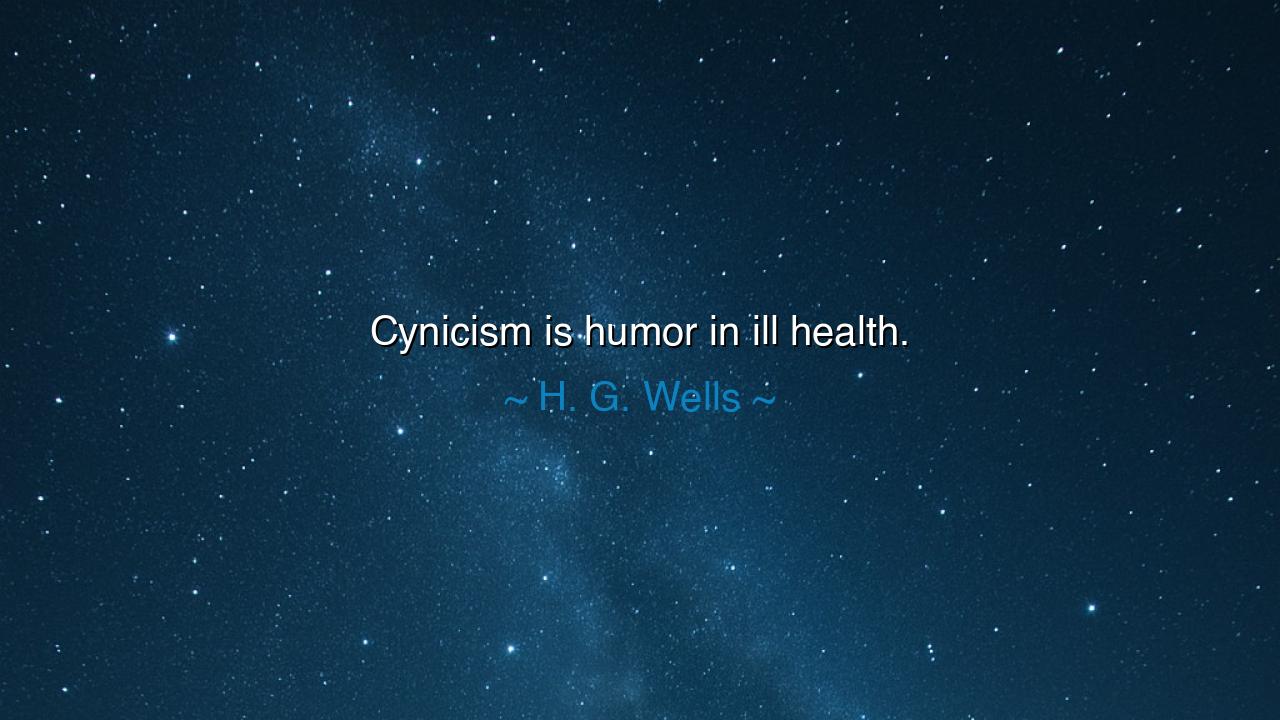
Cynicism is humor in ill health.






“Cynicism is humor in ill health.” — H. G. Wells
Hear, O seeker of wisdom, the words of H. G. Wells, the prophet of imagination and the chronicler of futures unseen. In this brief yet profound saying, he unveils a truth about the human spirit — that when the laughter of the heart grows sick, it becomes cynicism. Where once there was lightness, there comes shadow; where once there was joy, there comes bitterness dressed in wit. For humor, in its pure form, is the laughter of understanding — the soul’s way of dancing with the absurdity of life. But when that laughter is poisoned by pain, by disappointment, by weariness of the world, it twists into something sharp and defensive: cynicism, humor’s dark reflection.
In the age of H. G. Wells, the world was both awakening and unraveling. The dawn of science brought marvels — flying machines, wireless voices, glimpses into the atom — yet also the machinery of war and empire. Wells saw both the promise and the peril of human progress. He understood that laughter, once a celebration of resilience, had become, for many, a mask for despair. His words, “Cynicism is humor in ill health,” are not condemnation, but compassion. They are the diagnosis of a spiritual ailment: the sickness that comes when hope itself feels foolish, and laughter becomes armor instead of release.
To grasp this truth, look to the story of Diogenes, the ancient Greek who lived in a barrel and mocked the pomp of Athens. He was called a cynic, from the Greek kynikos, meaning “dog-like,” for his growling contempt of society’s pretensions. And yet, in his earliest days, his mockery was a form of protest — pure and purposeful, a demand for authenticity. But as the centuries passed, the word “cynicism” changed. What was once noble simplicity decayed into scorn; what began as moral courage became moral fatigue. Thus, Wells’s insight is born of history itself: that the laughter which once healed the spirit can, when corrupted by sorrow, turn inward to wound it.
For true humor is an act of generosity. It laughs with life, not against it. It sees the folly of mankind and forgives it in the same breath. But cynicism laughs to belittle, to distance, to survive. It is the laughter of one who has seen too much pain and trusts too little joy. The cynic cloaks his disappointment in cleverness, his wounds in irony. His words may sparkle, but behind them lies exhaustion. And though his tone may seem wise, it is not wisdom — it is weariness disguised as insight. Wells, the physician of modern souls, recognized this disease of the age: a generation too enlightened to believe, yet too bruised to love.
Consider, too, the writer Mark Twain, who balanced upon this edge. His humor, rich and sharp, revealed the follies of men, yet never abandoned compassion. He laughed, but his laughter carried the ache of one who still hoped for better. Twain’s humor was alive, even when wounded; it sought to heal through truth. But when the same wit loses its tenderness, when it no longer hopes to uplift or awaken, it sickens into cynicism. The difference between them is not in intellect, but in spirit. The healthy heart laughs to connect; the sick heart laughs to protect.
This is the warning Wells bequeaths us: guard the health of your humor, for it mirrors the health of your soul. When you catch yourself sneering where once you smiled, judging where once you forgave, remember — this is the whisper of inner fatigue. It is not the world that has lost meaning, but the heart that has lost warmth. Restore it by seeking wonder once more. Read, walk, love, create — do the things that remind you that life, for all its madness, still bears beauty. Laughter is sacred when it springs from gratitude, not contempt.
Let this lesson settle deep within you, O listener. Cynicism is the rust of the heart; it comes from neglect, from too much exposure to disappointment and too little renewal of hope. But humor, when kept pure, is light — the fire that keeps the human spirit alive amid darkness. Feed that fire with kindness, with curiosity, with the courage to still believe in goodness despite the evidence. For as Wells has shown, the measure of a soul is not how much it mocks the world, but how much it can still find cause to laugh and love it.
So walk through life as a healer of laughter. Let your humor be a bridge, not a blade. Laugh not to escape the world, but to embrace it. And when you feel cynicism creeping in — when laughter turns bitter and wit becomes armor — remember the ancient cure: gratitude, tenderness, and the will to see beauty again. For laughter that springs from love will never fall ill, and a heart that keeps its joy will never grow cynical.






AAdministratorAdministrator
Welcome, honored guests. Please leave a comment, we will respond soon